Agent Cody Banks 2: Destination London
 for action violence and some crude humor.
for action violence and some crude humor.
Reviewed by: Caroline Mooney
CONTRIBUTOR
| Moral Rating: | Average |
| Moviemaking Quality: |
|
| Primary Audience: | Pre-Teens Teens Family |
| Genre: | Action Adventure Comedy Romance |
| Length: | 1 hr. 40 min. |
| Year of Release: | 2004 |
| USA Release: |
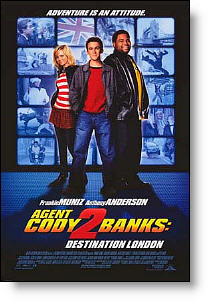
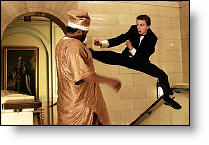
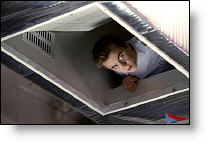
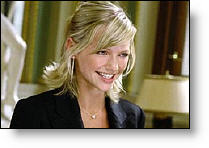
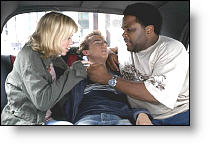
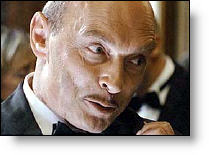
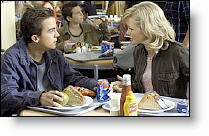
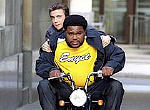
| Featuring |
|---|
|
Frankie Muniz Anthony Anderson Hannah Spearritt Cynthia Stevenson Keith David |
| Director |
|
Kevin Allen |
| Producer |
| David A. Nicksay, Dylan Sellers, Guy Oseary, David Nicksay |
| Distributor |
Read our review of Agent Cody Banks 1
Believing they are providing their son Cody (Frankie Muniz), with a traditional summer vacation at Kamp Woody, Cody’s parents (Cynthia Stevenson and Daniel Stevenson), along with his younger brother Alex (Connor Widdows), unknowingly send Cody to a covert CIA spy training camp. The kids at Kamp Woody learn about explosives, weapons, and self-defense instead of swimming and canoeing.
During what seems to be a routine simulation drill, Cody helps his instructor, Victor Diaz (Keith Allen), escape by helicopter. Not until after Diaz’s escape does Cody learns from the director (Keith David), that the attack was no simulation, that it was indeed a real attempt by the CIA to catch the “good guy gone bad” villain. Diaz steals a top secret mind control software program with the intention of taking over the world.
To catch Diaz, and retrieve the mind control program he stole, Cody travels to London to meet up with and hopefully capture Diaz and his partner in crime, researcher and scientist, Lord Duncan Kenworth (James Faulkner). Disguised as a gifted clarinet player from the United States, Cody enrolls in a youth orchestra run by Kenworth’s wife, Josephine (Anna Chancellor). The only problem is that Cody cannot play the clarinet, a fact he confesses to the CIA. Nevertheless, the CIA provides Cody with a preprogrammed Clarinet, guaranteed to cover up his lack of talent, as well as a few other “Bond-like” spy gadgets, and, of course, a partner.
Cody teams up with Derek Bowman (Anthony Anderson), a bumbling CIA agent who happens to be on probation. Cody and Derek, along with additional help from another spy youth from British Intelligence, Emily (Hannah Spearitt), share a multitude of action packed adventures together and save the world from the evil plot of Diaz and Kenworth, to control of the minds of the world’s leaders.
For the most part, “Agent Cody Banks: Destination London” is a “kiddy” spy spoof film. You won’t be hearing this film mentioned at the Academy Awards Ceremony next year, but for sheer entertainment purposes, I find it satisfactory. Like many films made for children, the expressions and actions of characters are over exaggerated for easier interpretation among a younger audience.
The cinematography falls short as well. During one particular chase scene, the camera switches from one character to another, making it difficult to determine who is chasing who. Nevertheless, my children looked past the film’s shortcomings and enjoyed it thoroughly.
As a parent and movie critic, my job is to reflect on the film’s content and report to you, the reader and potential movie viewer, any questionable incidents within the film that might affect your family viewing decision. For more convenient reading, I will use subheadings to discuss the issues of violence, language, crude humor and attitudes.
Violence:
Although viewers see no blood or killing, there is a good bit of fighting. However, the fighting is not graphically realistic. In one scene towards the end of the movie, for example, Cody and Diaz fight in the Queen of England’s gift room. Many items on display crash to the floor, and viewers see the characters fighting, but the camera moves around quickly without stopping to focus in on the actual punches.
The villains, in another example, use some sort of spray to knock out Cody, the President, and other victims before implanting the mind control devices in their teeth.
Cody slaps Derek in the face, during one scene toward the end of the film, in order to remove the mind control implant from his mouth.
There are more than just these three incidents of violence, but since the other examples are similar to the ones I mention above, suffice it to say that the film contains violence of a non-graphic and unrealistic nature. In fact, the fighting scenes result in no real injuries. Fighting, though it is seen throughout the film’s entirety, is bloodless and exaggerated to identify clearly the heroes of the film.
Language and crude humor:
The film uses a mild amount of crude language. Derek coughs, in one instance, and mutters the word “jackass.” My children did not notice the explicative, but I heard it clearly. I wonder why the word was even included since Derek tries to disguise the word under a coughing sound. It serves no purpose.
Cody’s younger brother, Alex, calls Cody a “whack job” and suggests trading his brother in for a “hot chick.” A man from the music hall tells Cody to “Haul some ass and get to class.” Other words or phrases such as “Suck,” “Limey,” “Bonehead,” and “Screwed up” are also used. The phrase, “what in the hell.” is used once and the Lord’s name is used once in vain.
As for crude humor, Kenworth passes gas in an elevator. Emily says “Don’t get your knickers in a wad” to Cody, and Cody slings food at the other students during dinner one night. I don’t find these things particularly appalling, just juvenile.
Attitudes:
Despite the violence, mild language, and crude humor, the attitudes portrayed within the film bother me the most. The British characters, with the exception of Emily, are largely stereotypical of 19th century personalities. The other children in the youth orchestra, boys and girls of different nationalities, are stereotype characters as well. The young boy from Germany looks like an Arian prototype, and the girl from India is “dingy.” Even Cody’s parents appear naïve and stupid as they head back home after Parent’s Night feeling good about leaving him at Kamp Woody.
Perhaps the stereotyping is simply exaggerated to distinguish the characters more clearly, but it seems that Cody and Emily are the only “cool” characters in the film. Clearly though, the adult characters are buffoons.
In the beginning of the film, Cody trusts Diaz, his leader and teacher. Diaz betrays Cody and eventually tries to destroy him. A troubling line in the film occurs when Diaz tells Cody to trust no one, that “trust equals death.”
Another aspect of the film I dislike is Cody’s dishonesty towards his parents. He hides the fact that he is a CIA agent and that Kamp Woody is actually a covert training facility; never mind the fact that Cody is only 16 years old. Granted, his dishonesty is lessened by the fact that he is a CIA field agent, operating in the line of duty, but at age 16 he is still under the authority of his parents.
Along with the above issues, I think it would be wise to discuss with your children the overall reality of the film. Would the CIA even hire a young boy to travel overseas and risk his life to bring a criminal to justice? I think not. Additionally, is it true that we can trust no one? Again, I think not.
Although my children enjoyed the film, and did not hear or understand the offensive language and crude humor, I advise you to discuss the film’s subtle motive, to undermine adult and parental authority, with your children. Many films today reverse the role of parents and children; it is popular to portray adults as child like and the children as adult like. Encouraging our children to take on adult roles as they rebuff parental authority can only lead to poor decision making and painful consequences.
If your children understand the distortion of biblical reality offered by the film, “Agent Cody Banks: Destination London,” then you can most likely enjoy watching this “kiddy” spy spoof as a family.
Violence: Moderate | Profanity: Minor | Sex/Nudity: None


[Better than Average/1]
[Average/4]
[Better than Average/4]
[Excellent!/2]

My Ratings: [Better than Average/3]